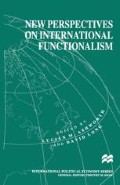Abstract
In the early part of the twentieth century, David Mitrany’s functional approach to the development of international organization made a distinctive contribution to the emerging discipline of international relations. While other liberal rationalists were debating the relative merits of moderating state power through economic cooperation or by the creation of a world organization, he advanced the terms of the discussion by introducing the prospect of functional international authority, which held out the promise of accomplishing the goal of restraining state power without falling into the problems associated with the grandiose ideals of a new world order.
Access this chapter
Tax calculation will be finalised at checkout
Purchases are for personal use only
Preview
Unable to display preview. Download preview PDF.
Notes
K. J. Holsti, The Dividing Discipline: Hegemony and Diversity in International Theory ( Boston: Unwin Hyman, 1985 ).
Michael Banks, ‘The Inter-Paradigm Debate,’ in Margot Light and A. J. R. Groom (eds), International Relations: A Handbook of Current Theory ( London: Frances Pinter, 1985 ). Banks’s definition of the categories as realist, pluralist and structuralist predates those of Olson and Groom. He also makes the case that Mitrany’s functionalism is an important precursor to the pluralist paradigm.
Martin Wight, ‘Why Is There No International Theory?’, in Herbert Butterfield and Martin Wight (eds), Diplomatic Investigations (London: George Allen & Unwin, 1966 ), p. 27.
F. Parkinson, The Philosophy of International Relations: A Study in the History of Thought (Beverly Hills, CA: Sage Publications, 1977), Chapter 6, ‘Functionalism: Commercial and Industrial’ — see, especially, pp. 101–7. He does mention the impact of Comte on H. G. Wells as a British Fabian.
Charles Pentland, International Theory and European Integration (London: Faber & Faber, 1973), p. 85.
F. J. Harrison, Europe In Question (London: George Allen & Unwin, 1974), pp. 28 and 33. This point is also made by James Patrick Sewell, Functionalism and World Politics: A Study Based on United Nations Programs Financing Economic Development ( Princeton, NJ: Princeton University Press, 1966 ), p. 38.
Paul Taylor, International Organization in the Modern World: The Regional and the Global Process (London: Frances Pinter, 1993), pp. 84, 108 and 114.
Editor information
Editors and Affiliations
Copyright information
© 1999 Palgrave Macmillan, a division of Macmillan Publishers Limited
About this chapter
Cite this chapter
Cooper, J.D. (1999). Organizing for Peace: Science, Politics and Conflict in the Functional Approach. In: Ashworth, L.M., Long, D. (eds) New Perspectives on International Functionalism. International Political Economy Series. Palgrave Macmillan, London. https://doi.org/10.1007/978-1-349-27055-2_2
Download citation
DOI: https://doi.org/10.1007/978-1-349-27055-2_2
Publisher Name: Palgrave Macmillan, London
Print ISBN: 978-1-349-27057-6
Online ISBN: 978-1-349-27055-2
eBook Packages: Palgrave Political & Intern. Studies CollectionPolitical Science and International Studies (R0)

